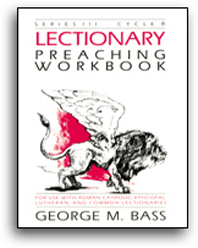SermonStudio
Proper 24
Preaching
Lectionary Preaching Workbook
Series III
With the church year nearing the end of its annual cycle - and with Advent (with its eschatological content) only six weeks away - the balance between the "Little Easter" Sunday theme is disturbed. The "Come, Lord Jesus! " cry of Pentecost/Advent tends to dominate the "He is risen!" song of Sunday. As the Sundays of Pentecost are counted off, and as Christ the King Sunday draws near, this eschatological note of the church coincides more and more with the fundamental, eschatological theology of the Gospel of the Year, Mark.


